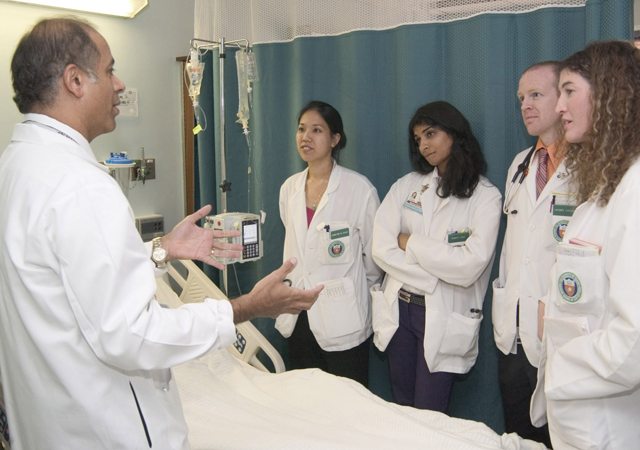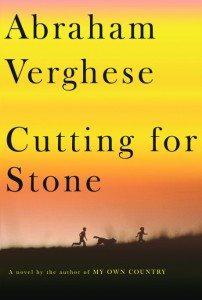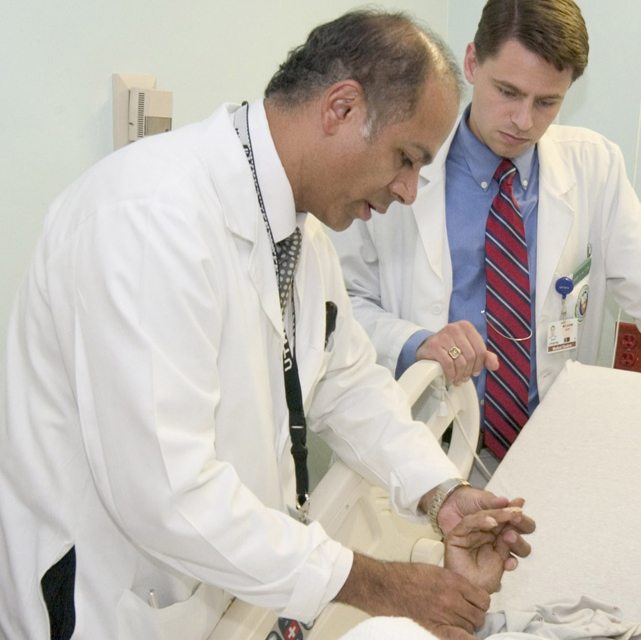
Dr. Abraham Verghese on Strength & Vulnerability
“Novels are instruction for living,” says Dr. Abraham Verghese, and for him writing and medicine are not two different disciplines – they are intricately linked. It’s almost as if the writing makes him a better doctor, completes him. Author of two acclaimed non-fiction books, ‘In My Own Country’ and ‘The Tennis Partner’, Verghese is the author of the best-selling novel ‘Cutting for Stone.’ It was on the New York Times Best Seller List for 60 plus weeks and over a million copies have been sold.
“I started reading it on a Friday evening and never put down the book till both my shoulders started aching and only interrupted my reading to meet my essential needs,” comments one reader, Sophie, on a blog. “I traveled with Mary Joseph Praise, I lived in Hema’s household, I cried and laughed with them. My heart burned to meet a doctor like Ghosh. When I slept for a few hours on the nights of Friday and Saturday, I dreamed about them.” Another fan wrote: “In both memoir and novel you expose your wisdom, your strength, your vulnerability, your humanity. Bravo.”
What causes these deep connections between his readers and Abraham Verghese? A thoughtful empathy seems to populate the pages of his writing and somehow touch many lives. ‘Cutting for Stone’ took over ten years to complete. On a deeper level, the book is an exploration of medicine, ethics, the relationship of patient and physician and the dichotomies of the healing profession. It is, in fact, for Verghese, a distillation of all these dilemmas seen through the lens of his own experiences and imagination.
The Journey
Verghese, who was born in Addis Ababa, has seen enough conflict in real life to be able to put pen to paper and create powerful writing. As a youth, the military coup in Ethiopia meant leaving home for the unknown: “It meant that I didn’t belong even though I thought I did,” he recalls. “There was a huge moment of disconnection with the place that I did love. After that you’re attached to places, but it’s not home, it’s not where your mother and your mother’s mother and everyone come from. I feel that loss.”
Currently Verghese is Professor for the Theory and Practice of Medicine at the Stanford University School of Medicine and Senior Associate Chair of the Department of Internal Medicine in California.
The journey from the past to the present is a rocky one, one of finding himself and his true calling.
From Ethiopia he came to America, where he worked as an orderly in New Jersey before leaving for India to complete his medical studies at Madras Medical College. He then found himself back in America, a lost and lonely foreign medical graduate doing a residency in Johnson City, Tennessee. After that he did his fellowship at Boston University School of Medicine and worked at Boston City Hospital for two years.

These were the days of the start of the horrific AIDS epidemic and as an assistant professor of medicine he saw first hand the tragedy of AIDS in rural communities and how it impacted so many lives. His hands-on work with dying patients and the relationships he formed affected him deeply. Writing became an emotional outlet and he also enrolled at the Iowa Writers Workshop at the University of Iowa, earning a Master of Fine Arts degree there.
Verghese next moved to El Paso, TX where he was professor of medicine and chief of the Division of Infectious Diseases at Texas Tech Health Sciences Center. He lived here for eleven years and this was also where his writing became a serious commitment.
His debut book, ‘My Own Country: A Doctor’s Story’ was a powerful memoir about working with AIDS patients in rural Tennessee, and in the process, finding himself. It was a finalist for the National Book Critics Circle Award and selected by Time magazine as one of the five best books of the year, and was also made into a film by Mira Nair.
“The Tennis Partner,” his next book, was about the drug addiction and death of his friend, a young medical student. It became a New York Times notable book and a national bestseller. His articles have also appeared in many publications including Granta, The New York Times and The Atlantic.
For Verghese, writing and medicine are closely knit. He says that in medical school you are taught to observe, pick up on details and bring it all into a diagnosis, and these are factors fundamental to the process of writing too.
“I often feel I write in order to understand what I’m thinking – when I start to write, then it starts to emerge, a sort of secondary, tertiary understanding that I wouldn’t have had if I hadn’t tried to write it – so that’s the part of writing that I think is utterly mysterious and enjoyable,” he says.
Verghese was the founding director of the Center for Medical Humanities and Ethics at the University of Texas Health Sciences Center in San Antonio, a novel program for medical students, with an emphasis on beside medicine, clinical examinations and empathy toward patients and their families.
“The humanities are vital in helping students maintain empathy with their patients,” he says. “Students come to medicine with a great capacity to imagine the suffering of others. In their clinical years, however, they are taught to take the patient’s unique story of illness and translate it into the depersonalized language of the chart. We want to keep alive their innate humanity, integrity and empathy.”
Abraham Verghese – A Detective at the Bedside
In his current work at Stanford, Verghese finally gets a chance to merge his two callings – medicine and writing. He’s a professor with tenure which is something reserved for those with research grants and scientific breakthroughs under their belt. He says, “It’s just very humbling to see how over time the effect of my writing has been that it’s taken to be the equivalent of scientific research. I think it’s looked at as seriously a contribution as research – and that’s really gratifying to me.”

He now has a room of his own to write and to explore the world of medicine not only through charts and X-rays but through the written word. He also works with medical students in internal medicine and relishes the opportunity to shape young minds at a time when health care seems to be in crisis. As he says, “We have never had more ability to bring patients a cure or better their medical conditions, yet I think there has never been a time when patients have been more dissatisfied with medicine.”
The Human Touch
Indeed, one of the things which really irks Verghese is the disconnect between physician and patient as technology takes over and the human touch is lost. “It’s a very strange paradox – science is at this brilliant phase where we are curing some cancers with a single pill,” he says. “The public, I think, feels quite the opposite, that medicine is getting further and further away from the patient, from one human being interacting with another. It’s more like you’re getting swallowed up by a system when you have an illness and being farmed out to all these tests and specialists.”
The case of the invisible patient, the I-patient who exists just on the physician’s computer monitor as so much data, while the real live patient in the bed is ignored, has become an important issue for Verghese, both in work and his writing.
“I think that there’s a very special transaction that takes place between physician and the patient during the course of a careful examination,” he says. “It’s during that exam when the physician touches you and pulls your eyelid down and looks into your eyes and thumps on your chest – that’s when a very ritualistic bond is formed and if you shortchange that by just sitting behind your desk and saying ‘Let’s send you for this test, let’s send you for that test,’ you have essentially shortchanged yourself from an important transaction.”
The Power of the Written Word
As a young voracious reader, it was the written word which had introduced him to the world of medicine, of idealistic doctors and the power to heal, and he is a believer in the power of literature to add another dimension to the doctor’s skills. “Students come to medicine with a great capacity to imagine the suffering of others. Through the humanities — literature, art, theater, and film — we can keep the students’ imagination of the suffering of others alive. Fiction is, as novelist Dorothy Allison said, ‘the great lie that tells us the truth about how the rest of the world lives.’”
Verghese gets a real pleasure from teaching his students about this disappearing world of real doctoring, where the patient is not a piece of virtual data on a computer screen nor a number on a hospital bed but a real human being.
“In this era of technology, it’s almost like being a kind of artisan and preserving an older art form or something!” he says. “The students uniformly came to medicine imagining that it would be something like this, the sense of being a detective at the bedside. I think that they thrill to someone who can show this to them – they love it and it’s very relevant to them.”
© Lavina Melwani
(This article first appeared in Hi Blitz)
The Series:
Siddhartha Mukherjee-Battling the Emperor
Sanjay Gupta, CNN”s Doctor to the World
Atul Gawande – A Checklist for Success
Abraham Verghese – The Healing Touchstone
Sandeep Jauhar – The Human Factor

4 Comments
Elizabeth, thanks for writing in – so glad you enjoyed the article! Will keep you posted about Abraham Verghese’s next book.
I loved reading “Cutting For Stone” from first page to the end…Though it received lot of recognition in US, I don’t think it received much popularity in India, even in Kerala – the place of Sister Mary…
Thank you so much for writing about Dr Abraham Varghese..It was so nice to read about the person who wrote a book like “Cutting For Stone”
Hi Chris,
Thank you for your comments – we certainly need more physicians like Dr. Abraham Verghese – and yes, more writers like him too!
Thank you so much for writing this. As a pediatric nurse, mom, reader, human being, the good doctor and I are of the same mind.
I am so pleased that he can reach so many with his writing and continue practicing, teaching. His message needs to reach more in and out of the medical community.
I am forwarding this article to my brother, a neurologist of similar nature in Gainesville, FL and my nephew, a junior in medical school, married, expecting a child, who taught literature to inner city youth before embracing medicine.
I sent Dr Verghese’s books to both of them and several other friends, coworkers, acquaintances. They have been greatly appreciated by all. I am heartened by each new person who is open to this voice. I will forward this to his readers.
I think our President is of like mind and it saddens me that all he has to give is being held hostage and strangled by the infantile members of Congress that are blind to the greater needs of the people in this country.
Chris